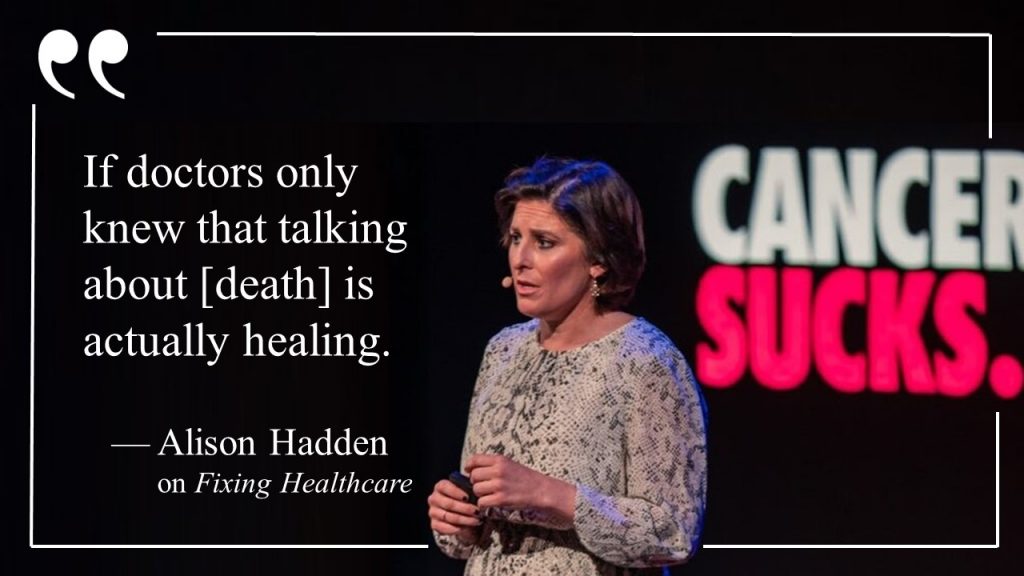Podcast: Play in new window | Download
Subscribe: Spotify | Email | RSS | More
Alison Hadden is a lifelong athlete, an adventurer and was, by age 38, a marketing executive at three different billion-dollar tech companies. But in 2018, Alison says “life burst through the door.”
She was diagnosed with advanced breast cancer. Three years later, she is grappling with a terminal diagnosis.
Neither Alison nor her doctors are certain how much time she has left. And yet, Alison often finds herself waiting and waiting … and waiting on the people who provide her medical care. After she first felt a lump in her breast, she waited more than a month for her diagnosis. After scheduling a recent call with her oncologist to go over lab results, she waited by her phone for over three hours. Alison got so sick of waiting weeks for her appointments that she started bribing the scheduling nurses with donuts.
In this episode, learn about the culture of medicine from a patient with no time to waste.
Interview Highlights from Alison Hadden
On the painstaking process of getting diagnosed
“I was 38 years old at the time, was super fit, athlete my whole life, had, I think, gone out for a eight or 10 mile trail run. And when I came back that day, I just had recognized when I was getting in the shower that there was a lump in my breast and I got on it pretty quickly, assuming it was nothing, but wanting to make sure I did everything I could … It took probably a week for me to get an appointment and that was me working hard to try and get the earliest appointment that I could. I had another week or two weeks until I was able to get my mammogram scheduled, and then another week to get the biopsy scheduled. And I was diagnosed, probably about a month after initially finding that lump in September of 2018, I was diagnosed with stage three.”
On ‘project-managing’ her own cancer treatment
“I was super overwhelmed. The news of this came in as a complete shock. Friends said that I was like the healthiest person they know, didn’t drink, smoke, do drugs, appeared very fit. So, this was just a huge shock to myself and my family. And the overwhelming sort of tidal wave of appointments and scans, and the second opinions, everything that happened in that first six weeks, was just so much. And I remember thinking, gosh, I am so on top of things, I have a bias towards action when I’m anxious. I can’t imagine someone that was older if they had to navigate my situation, if someone was not tech savvy, or even kind of like fast on their feet, and if someone was living alone and having to navigate all of it by themselves … I was a marketing executive in the tech industry. I was used to taking charge and leading. And I was project-managing my own cancer treatment.”
On Covid-19 vaccine vs. cancer-care experience
“If I can schedule a COVID vaccine through a CVS, why can’t I use a mobile app to book my labs next week before chemo and be able to change it up until a certain point? Why can’t I do that? Why do I still need a human scheduler … She looks at the schedule and then we go through it together. Why?”
On patient anxieties that doctors don’t seem to understand
“I love my oncologist. I think he’s fantastic. But even he, a couple of days ago, had told me, ‘You’re going to get the brain scan on Wednesday. You’re going to get the chest scan on Thursday. And then Friday morning, I’ll call you with the results.’
And it’s Friday morning and it’s 8:00, I set my alarm. It’s 9:00, it’s 10:00. At 10:00, I was bursting so I left his office a message and basically just said, ‘Hi, I’m still here waiting nervously, anxiously waiting.’ And I got a call around noon, or maybe 12:30, and he apologized right away and just said, ‘Sorry. I had a lot of things going on this morning.’”
On living with the reality of death
“I have no choice but to confront my mortality on a daily basis, but also find a way to not live in such fear of the unknown and the uncertainty around what’s it going to look like? When is it going to happen? What’s the deterioration going to be? The more I worry about the future, the more I’m taking away from the present. And all I’m trying to do is live for now and maximize my moments in a 24-hour period, which is everything that [my podcast] No Time to Waste is about. It’s about confronting that mortality, crafting a life without regrets, and maximizing moments based on the things I talk about, which is gratitude, human connection, and joy.”
READ: Full transcript of our latest discussion with Alison Hadden
Fixing Healthcare is in its fifth season, which focuses on the culture of medicine. For Dr. Robert Pearl, this topic is of vital importance to the health and well-being of patients. For years, he has been researching and reporting on physician culture—efforts that will culminate in the publication of his 2021 book, “Uncaring: How the Culture of Medicine Is Killing Doctors & Patients.”
* * *
Fixing Healthcare is a co-production of Dr. Robert Pearl and Jeremy Corr. Subscribe to the show via Apple Podcasts or wherever you find podcasts. Join the conversation or suggest a guest by following the show on Twitter and LinkedIn.

